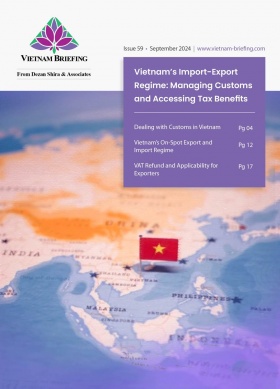Decree 163 Implementation: Shaping Vietnam’s Telecom Industry in 2025
Vietnam’s Decree 163 provides clear guidance on emerging services like data centers, cloud computing, and OTT telecom services, effective January 1, 2025. Its provisions strengthen the implementation of the 2024 Telecommunications Law.
On December 24, 2024, the Vietnamese government issued Decree No. 163/2024/ND-CP (hereinafter, Decree 163), offering guidance for implementing the Telecommunications Law that took effect on July 1, 2024.
Replacing Decree No. 25/2011/ND-CP and its amendments, Decree 163 is an important addition to Vietnam’s telecommunications regulatory framework. It introduces clear guidance on emerging services like data centers (DC), cloud computing, and over-the-top (OTT) telecom services, with these provisions becoming effective on January 1, 2025.
Key highlights of Vietnam’s Decree 163 and impact for telecom sector
Classification of new services
Decree 163 brings significant changes by classifying DC, cloud computing, and OTT communication services as value-added telecom services. This classification aligns them with traditional value-added services such as email and internet access. By formally defining these new services, the government establishes a clear regulatory framework to oversee their operation and integration into Vietnam’s telecommunications infrastructure.
This move ensures that these services are subject to the same regulatory oversight as other telecom services, promoting transparency, competition, and consumer protection. It also reflects Vietnam’s recognition of the growing importance of cloud and data center services in a digitally driven economy.
Cross-border service provision
Decree 163 simplifies the process for offshore providers of telecom services who wish to serve Vietnamese users. Unlike previous regulations, these providers are no longer required to sign commercial agreements with licensed local telecom companies. Instead, they must notify the Vietnam Telecommunications Authority (VNTA) using prescribed procedures before offering services.
This change lowers barriers to entry for foreign telecom companies, encouraging investment and fostering innovation in Vietnam’s telecom sector. However, it also maintains regulatory oversight by requiring detailed notifications, ensuring that offshore providers operate within Vietnam’s legal framework.
Obligations for offshore providers
Offshore providers of basic internet telecom services, as well as DC and cloud service providers, are subject to specific obligations under Decree 163. These include:
- Notification to VNTA: Providers must submit corporate details, descriptions of their services, and contact information. Any changes to these details must also be promptly reported.
- Data management: Offshore providers are required to store user data and comply with Vietnam’s cybersecurity laws. This includes maintaining records of user information, such as names and phone numbers.
- Security measures: Providers must suspend services in cases of national emergencies or when instructed by competent authorities. They must also block access to harmful or illegal content upon request.
- User protection: Providers are prohibited from disclosing private user information except in legally permissible circumstances. They must also obtain user consent before accessing data on users’ devices.
Additionally, providers offering DC or cloud services to state agencies face an added requirement: the exclusive storage of data within Vietnam. This necessitates the establishment of local facilities for data storage, ensuring the security and sovereignty of state data.
Also Read: Vietnam National Assembly Approves Law on Data
Subscriber information management
Decree 163 introduces stricter measures to manage and verify subscriber information. Telecom providers must verify subscriber identities by matching details with the National Population Database. Other methods, such as one-time authentication codes (OTP) and video call verification, are also required to ensure accuracy and prevent fraudulent activities.
These measures aim to enhance trust and security within the telecom sector, providing greater protection for users while also ensuring compliance with legal requirements.
Expanded regulatory scope
In addition to regulating emerging services, Decree 163 introduces a framework for machine-to-machine (M2M) communication, which is classified as a basic telecom service. This development lays the groundwork for the regulation of Internet of Things (IoT) operations, which are increasingly integral to modern industries. By addressing M2M communication, Vietnam aims to stay ahead in managing technological advancements and their implications.
Industry implications
The implementation of Decree 163 is a clear signal of Vietnam’s commitment to fostering a fair and competitive telecommunications market. By providing detailed guidance on new services, the government aims to balance innovation with regulatory oversight, creating a stable environment for businesses and consumers alike.
The removal of foreign ownership caps for onshore providers is particularly noteworthy. This move allows 100 percent foreign-owned enterprises to operate in Vietnam, making the market more attractive to international investors. It also aligns with Vietnam’s broader efforts to integrate into the global digital economy and attract foreign direct investment (FDI).
However, the decree also signals increased regulatory scrutiny. Telecom enterprises, especially offshore providers, must conduct thorough compliance reviews to align their operations with the new requirements. Failure to comply could result in significant penalties or restrictions, highlighting the importance of proactive adaptation.
Conclusion
Decree 163 sets a new regulatory benchmark for Vietnam’s telecom industry. It addresses modern challenges such as cross-border service provision, data security, and subscriber fraud, while providing a framework for emerging technologies like IoT and M2M communication. Enterprises operating in Vietnam’s telecom sector must assess their compliance with these regulations and adapt quickly to avoid operational disruptions.
With its clear focus on fostering innovation, ensuring security, and protecting consumers, Decree 163 positions Vietnam’s telecommunications sector for sustained growth and competitiveness. As digital transformation continues to accelerate, this regulatory clarity will play a critical role in shaping the future of Vietnam’s digital economy.
About Us
Vietnam Briefing is published by Asia Briefing, a subsidiary of Dezan Shira & Associates. We produce material for foreign investors throughout Asia, including ASEAN, China, and India. For editorial matters, contact us here and for a complimentary subscription to our products, please click here. For assistance with investments into Vietnam, please contact us at vietnam@dezshira.com or visit us at www.dezshira.com.
Dezan Shira & Associates assists foreign investors throughout Asia from offices across the world, including in Hanoi, Ho Chi Minh City, and Da Nang. We also maintain offices or have alliance partners assisting foreign investors in China, Hong Kong SAR, Dubai (UAE), Indonesia, Singapore, Philippines, Malaysia, Thailand, Bangladesh, Italy, Germany, the United States, and Australia.
- Previous Article Vietnam’s Economic Report Card for 2024: GDP, Trade, FDI
- Next Article An Introduction to Doing Business in Vietnam 2025 – New Publication Out Now































